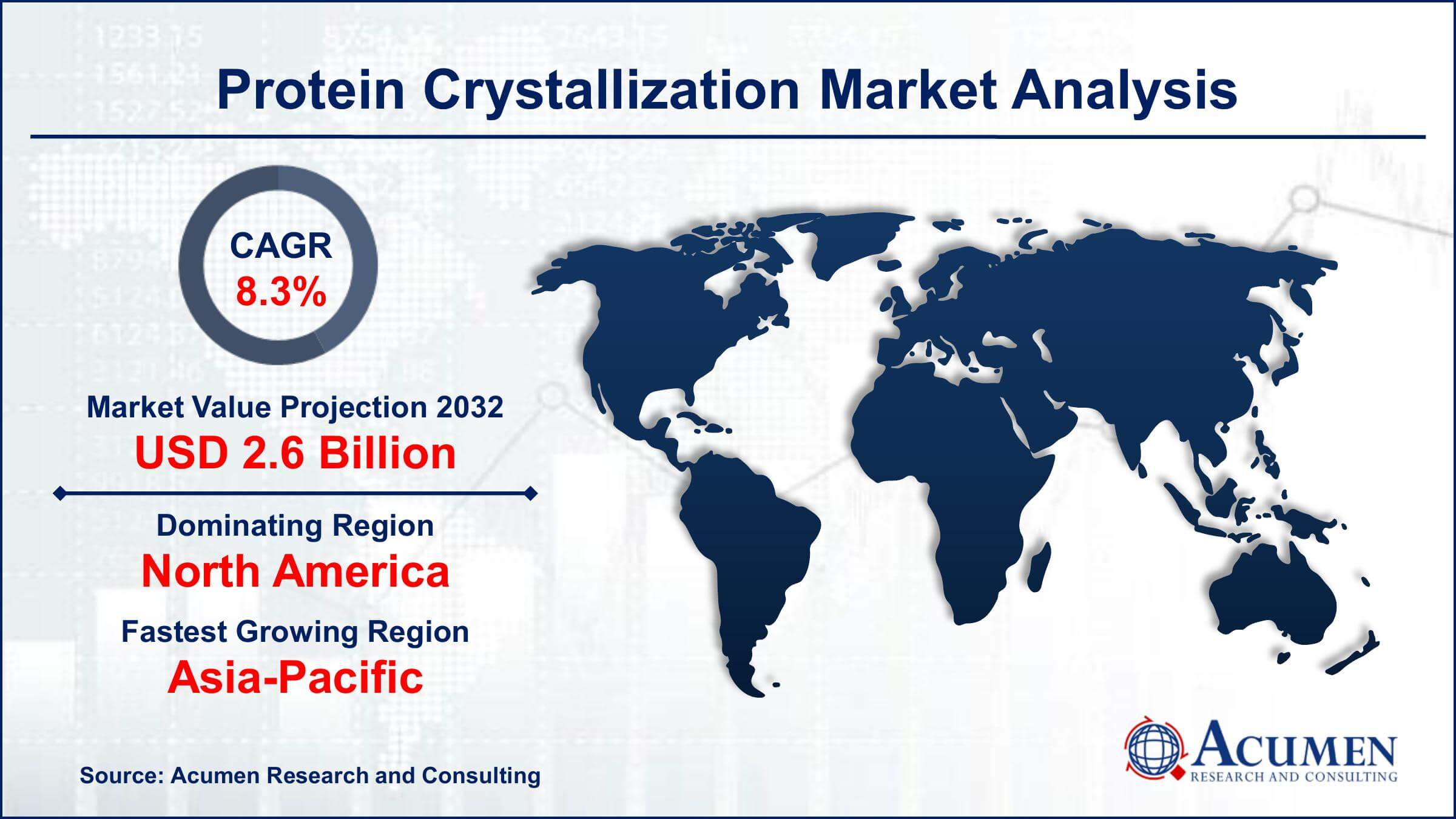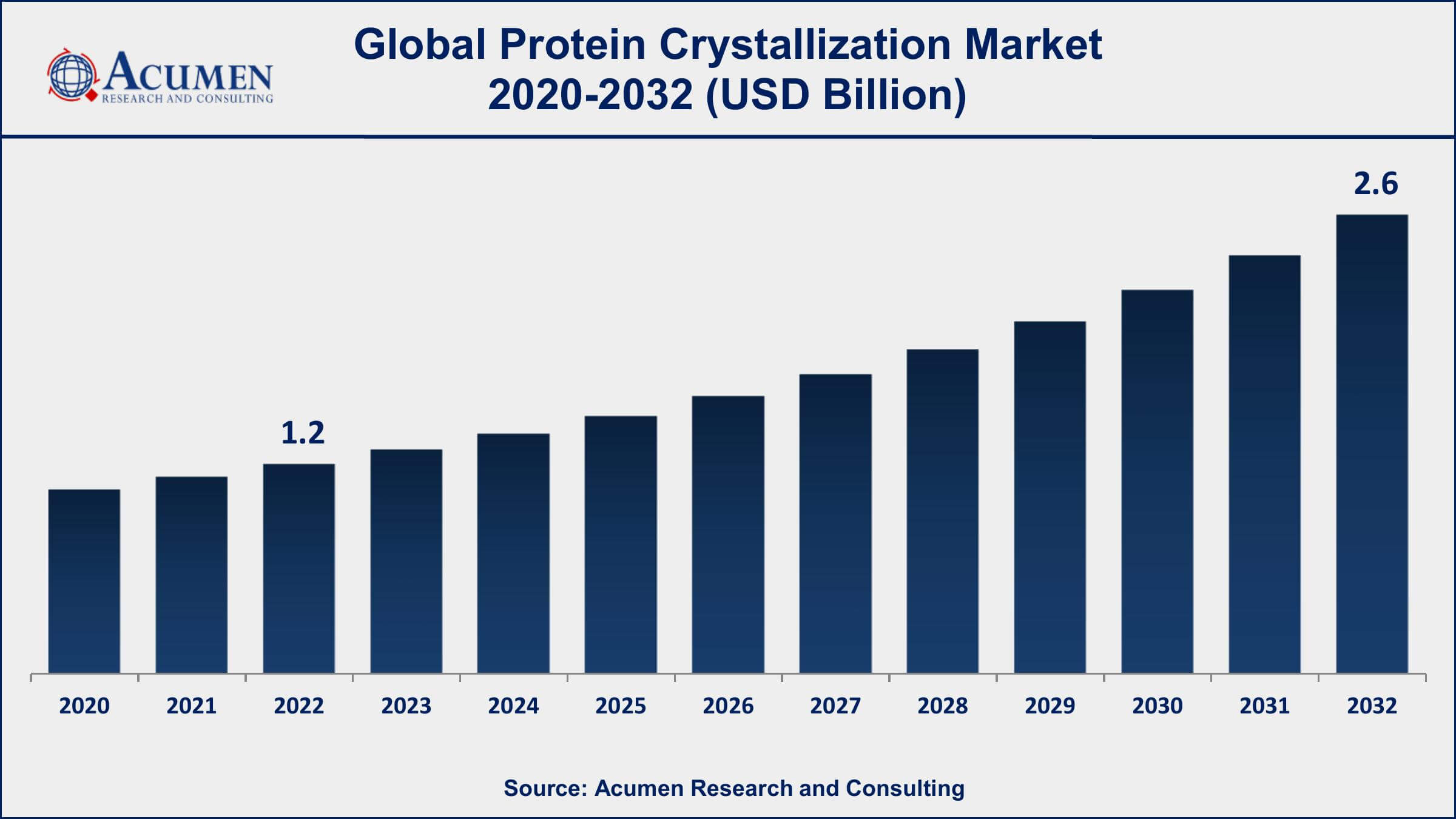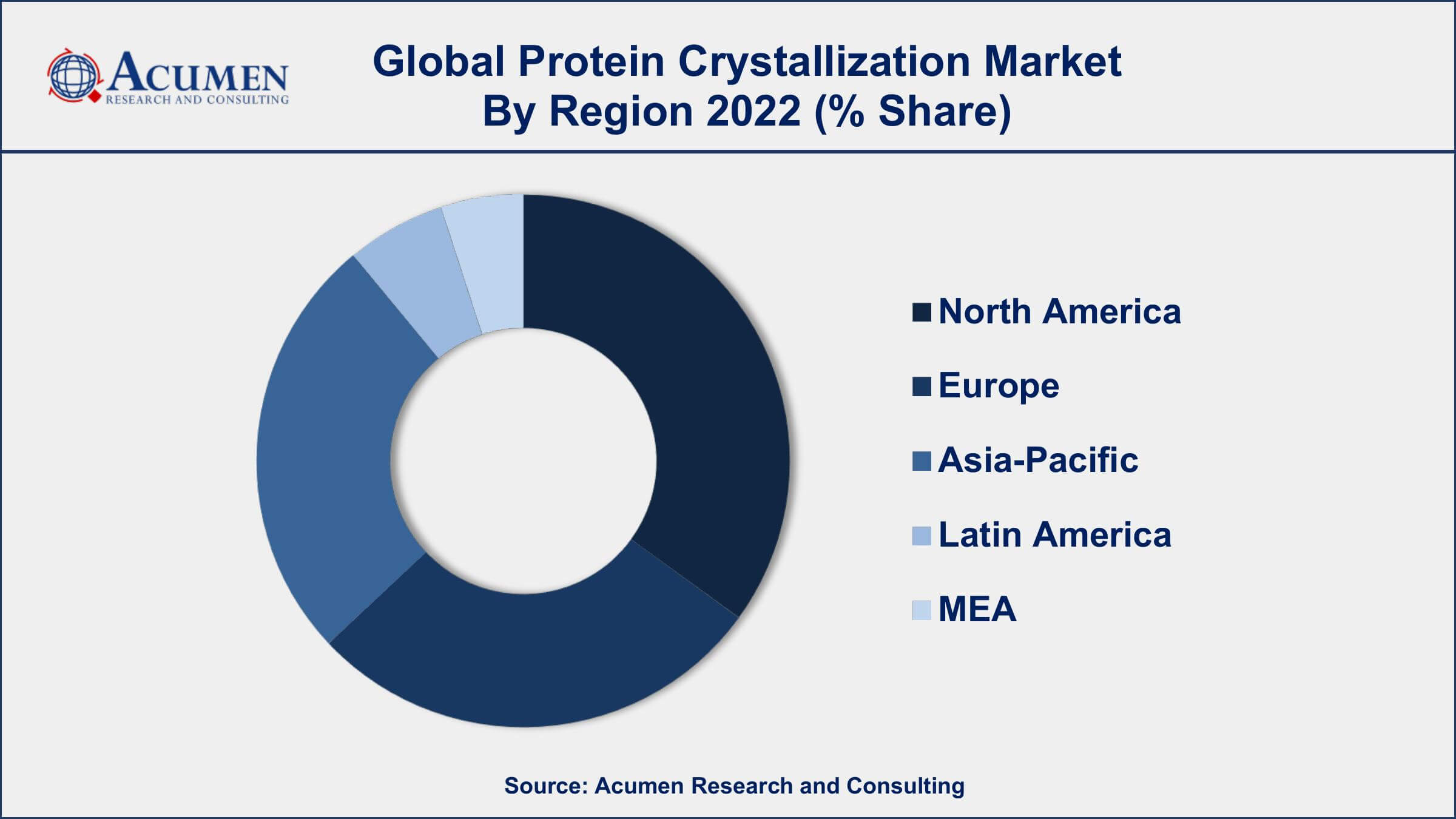Protein Crystallization Market | Acumen Research and Consulting
Protein Crystallization Market Size - Global Industry, Share, Analysis, Trends and Forecast 2023 - 2032
Published :
Report ID:
Pages :
Format :
The Global Protein Crystallization Market Size accounted for USD 1.2 Billion in 2022 and is projected to achieve a market size of USD 2.6 Billion by 2032 growing at a CAGR of 8.3% from 2023 to 2032.
Protein Crystallization Market Highlights
- Global protein crystallization market revenue is expected to increase by USD 2.6 Billion by 2032, with a 8.3% CAGR from 2023 to 2032
- North America region led with more than 37% of protein crystallization market share in 2022
- Asia-Pacific protein crystallization market growth will record a CAGR of more than 9% from 2023 to 2032
- By Technology, the X-ray crystallography segment is the largest segment of the market, accounting for over 52% of the market share in 2022
- By product, the consumables segment is expected to grow at a CAGR of 9.8% during the forecast period (2023-2032)
- Increasing demand for new drugs and therapies, drives the protein crystallization market value

Protein crystallization is a process that involves growing crystals of protein molecules in order to study their structure and function. The process of protein crystallization is important in the fields of biochemistry, biophysics, and structural biology, as it allows researchers to determine the three-dimensional structure of proteins at the atomic level. The basic process of protein crystallization involves dissolving the protein in a solution and then gradually reducing the solubility of the protein until it precipitates out of the solution and forms crystals.
The market for protein crystallization has been growing steadily in recent years, driven by the increasing demand for new drugs and therapies, as well as the expanding applications of protein crystallography in basic research. The growth of the market is attributed to the increasing R&D activities in the pharmaceutical and biotechnology sectors, the rising demand for protein therapeutics, and the increasing adoption of protein crystallography in drug discovery and development. Additionally, the development of advanced technologies for protein crystallization, such as microfluidics and robotics, is expected to further drive the growth of the market in the coming years.

Global Protein Crystallization Market Trends
Market Drivers
- Increasing demand for new drugs and therapies
- Rising R&D activities in the pharmaceutical and biotechnology sectors
- Growing adoption of protein crystallography in drug discovery and development
- Increasing focus on structural biology research
- Technological advancements in protein crystallization techniques, such as microfluidics and robotics
Market Restraints
- High costs associated with protein crystallization research and development
- Complexities involved in the protein crystallization process
Market Opportunities
- Increasing demand for personalized medicine and targeted therapies
- Growing demand for contract research services in the pharmaceutical and biotechnology industries
Protein Crystallization Market Report Coverage
| Market | Protein Crystallization Market |
| Protein Crystallization Market Size 2022 |
USD 1.2 Billion |
| Protein Crystallization Market Forecast 2032 | USD 2.6 Billion |
| Protein Crystallization Market CAGR During 2023 - 2032 | 8.3% |
| Protein Crystallization Market Analysis Period | 2020 - 2032 |
| Protein Crystallization Market Base Year |
2022 |
| Protein Crystallization Market Forecast Data | 2023 - 2032 |
| Segments Covered | By Technology, By Product, By End User, And By Geography |
| Regional Scope | North America, Europe, Asia Pacific, Latin America, and Middle East & Africa |
| Key Companies Profiled | Hampton Research, Rigaku Corporation, Molecular Dimensions, QIAGEN, Bruker Corporation, Jena Bioscience GmbH, Formulatrix, MiTeGen LLC, Agilent Technologies, Thermo Fisher Scientific, ARIANNE Life Sciences AG, and Art Robbins Instruments. |
| Report Coverage |
Market Trends, Drivers, Restraints, Competitive Analysis, Player Profiling, Covid-19 Analysis, Regulation Analysis |
Protein crystallization is the process of obtaining crystals of purified protein molecules from a solution, which allows for their structure and function to be studied in detail. The crystals are formed by reducing the solubility of the protein in the solution, thereby encouraging it to precipitate out and form a regular lattice-like structure. This process is critical for determining the three-dimensional structure of proteins at the atomic level, which can provide important insights into their function and interaction with other molecules.
Protein crystallization has a wide range of applications in various fields, particularly in drug discovery and development. The three-dimensional structures of proteins obtained through protein crystallography can help researchers design and develop drugs that are more effective and have fewer side effects. Additionally, protein crystallization can be used to study the mechanisms of various diseases and to design targeted therapies that can block specific protein interactions. Protein crystallography is also used in structural biology to study the interactions between proteins and other biomolecules, as well as in the fields of biochemistry and biophysics to better understand the fundamental properties of proteins.
The market growth is also attributed to the development of advanced technologies for protein crystallization, such as microfluidics and robotics, which are expected to further drive the growth of the market in the coming years. Additionally, the growth in the biologics market, which require protein crystallography for drug development, is also contributing to the market growth. The increasing focus on structural biology research and the potential for growth in emerging markets, such as Asia-Pacific and Latin America, also present significant opportunities for the protein crystallization market.
Protein Crystallization Market Segmentation
The global protein crystallization market segmentation is based on technology, product, end user, and geography.
Protein Crystallization Market By Technology
- X-ray Crystallography
- NMR Spectroscopy
- Cryo-electron Microscopy
- Others
According to the protein crystallization industry analysis, the X-ray crystallography segment accounted for the largest market share in 2022. This growth is attributed to the increasing adoption of X-ray crystallography in drug discovery and development, as well as the growing demand for protein therapeutics. X-ray crystallography is a widely used technique in protein crystallization for determining the three-dimensional structure of proteins. It involves shining a beam of X-rays through a protein crystal and measuring the diffraction pattern that results, which can be used to determine the arrangement of atoms within the protein. The x-ray crystallography segment has been growing steadily in recent years, driven by the increasing demand for protein structure determination in drug discovery and development.
Protein Crystallization Market By Product
- Instruments
- Crystal Imaging Instruments
- Liquid Handling Instruments
- Consumables
- Microplates
- Reagents & Kits/Screens
- Others
- Software & Services
In terms of products, the consumables segment is expected to witness significant growth in the coming years. This growth is attributed to the increasing adoption of protein crystallography in drug discovery and development, which is driving the demand for consumables such as protein purification reagents, crystallization plates, and microfluidic chips. The consumables segment of the protein crystallization market includes various products that are required for the protein crystallization process, such as reagents, kits, plates, and other laboratory consumables. This segment is a key component of the overall market, as the demand for consumables is directly linked to the demand for protein crystallization research and development.
Protein Crystallization Market By End User
- Pharmaceutical & Biotechnology Companies
- Academic & Research Institutes
According to the protein crystallization market forecast, the pharmaceutical & biotechnology companies segment is expected to witness significant growth in the coming years. This growth is driven by the increasing demand for new drugs and therapies, as well as the expanding applications of protein crystallography in drug discovery and development. Pharmaceutical and biotechnology companies are major end-users of protein crystallization products and services, as they require protein crystallography for drug discovery and development. These companies use protein crystallization to determine the three-dimensional structure of proteins, which is essential for the development of new drugs and therapies. As such, the pharmaceutical and biotechnology companies segment is a key component of the market.
Protein Crystallization Market Regional Outlook
North America
- U.S.
- Canada
Europe
- U.K.
- Germany
- France
- Spain
- Rest of Europe
Asia-Pacific
- India
- Japan
- China
- Australia
- South Korea
- Rest of Asia-Pacific
Latin America
- Brazil
- Mexico
- Rest of Latin America
The Middle East & Africa
- South Africa
- GCC Countries
- Rest of the Middle East & Africa (ME&A)

Protein Crystallization Market Regional Analysis
North America dominates the protein crystallization market due to the presence of a large number of pharmaceutical and biotechnology companies, academic and research institutes, and government initiatives supporting research and development. The United States is the largest market for protein crystallization in North America, accounting for the majority of the region's revenue. The presence of established pharmaceutical and biotechnology companies in the United States, such as Pfizer, Merck & Co., and Amgen, is a key driver of the market in North America. Moreover, the region has a well-established infrastructure for protein crystallization research and development, including advanced research facilities, equipment, and technologies. This infrastructure supports the development of new drugs and therapies, as well as the ongoing research and development in protein crystallization. In addition, the North American market is characterized by a high level of competition among key players, which drives innovation and the development of new products and services.
Protein Crystallization Market Player
Some of the top protein crystallization market companies offered in the professional report include Hampton Research, Rigaku Corporation, Molecular Dimensions, QIAGEN, Bruker Corporation, Jena Bioscience GmbH, Formulatrix, MiTeGen LLC, Agilent Technologies, Thermo Fisher Scientific, ARIANNE Life Sciences AG, and Art Robbins Instruments.
Frequently Asked Questions
What was the market size of the global protein crystallization in 2022?
The market size of protein crystallization was USD 1.2 Billion in 2022.
What is the CAGR of the global protein crystallization market from 2023 to 2032?
The CAGR of protein crystallization is 8.3% during the analysis period of 2023 to 2032.
Which are the key players in the protein crystallization market?
The key players operating in the global market are including Hampton Research, Rigaku Corporation, Molecular Dimensions, QIAGEN, Bruker Corporation, Jena Bioscience GmbH, Formulatrix, MiTeGen LLC, Agilent Technologies, Thermo Fisher Scientific, ARIANNE Life Sciences AG, and Art Robbins Instruments.
Which region dominated the global protein crystallization market share?
North America held the dominating position in protein crystallization industry during the analysis period of 2023 to 2032.
Which region registered fastest CAGR from 2023 to 2032?
Asia-Pacific region exhibited fastest growing CAGR for market of protein crystallization during the analysis period of 2023 to 2032.
What are the current trends and dynamics in the global protein crystallization industry?
The current trends and dynamics in the protein crystallization industry include increasing demand for new drugs and therapies, rising R&D activities in the pharmaceutical and biotechnology sectors, and growing adoption of protein crystallography in drug discovery and development.
Which product held the maximum share in 2022?
The consumables product held the maximum share of the protein crystallization industry.



